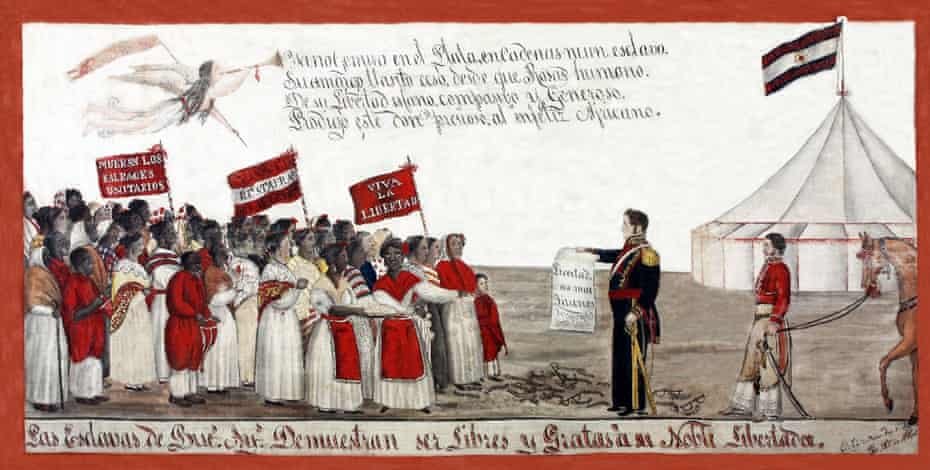
Argentina has long taken pride in its European heritage. The mass migration of 7 million Europeans, mostly Spanish and Italian, between 1850 and 1950, created a racial profile many Argentinians feel distinguishes their country from the rest of Latin America even today.
“Mexicans descend from the Aztecs, Peruvians from the Incas – but Argentinians descend from the ships,” goes an old saying that encapsulates Argentina’s perception of itself as a nation of transplanted white Europeans.
But that Eurocentric view is being vehemently disputed as not only outdated but also factually untrue by a generation of young Afro-descendant researchers and activists who wish to rewrite the accepted version of Argentinian history.
“Argentina needs to understand that it is both very racist and very Afro,” said black activist and researcher Alí Delgado.
University lecturer Patricia Gomes is another Afro-descendant researcher intent on demolishing Argentina’s mythical self-image as a white nation. “In Argentina it used to be said that here there were no blacks, therefore there was no one to be racist with – and hence there was no racism,” she said.
Delgado and Gomes point to recent studies of population surveys and genetics that paint a far different picture from Argentina’s accepted history: one recent study concluded that up to 9% of today’s Argentinians may have ancestry from Africa.
The reason is simple: between the 16th and 19th centuries – long before the wave of European migration – more than 200,000 enslaved Africans arrived at the twin ports of the River Plate, Buenos Aires and Montevideo, capital cities of what are now Argentina and Uruguay.
“The number of slaves who arrived to the region of the River Plate is almost half of those who arrived in the US, which gives an idea of the magnitude of slave traffic in the River Plate region,” according to Alex Borucki, a Uruguayan academic at the University of California Irvine, who co-manages the SlaveVoyages website that traces every ship carrying enslaved people that reached the Americas.
In a sign of the changing perceptions of Argentina’s racial identity, Gomes and Delgado are teaching Argentina’s first ever university courses on the subject.
Their two-month series of lectures for law students at the University of Buenos Aires in March and April was booked solid. Another two-month course will follow in August and September, and the pair are also considering an open seminar for the general public.
Gomes and Delgado argue that the idea of a European Argentina was a fabrication imposed by racist 19th-century leaders to erase Argentina’s rich black culture from the nation’s collective consciousness.
In 1778, Africans and Afro-descendants made up 37% of the population of what is now Argentina, according to a census by its Spanish colonialist rulers. In some major provinces the proportion was more than 50%.
That number did not drop significantly after independence from Spain in 1816: Afro-descendants accounted for 30% of the population of Buenos Aires for decades after independence. But after that, the number is unknown, because Argentina’s census bureau stopped collecting racial information.
“Census data was manipulated to erase us first from the statistics – and then from the history books,” says Gomes. “From the end of the 19th century the state meticulously began to make us invisible to present Argentina as homogeneous and of European descent.”
Argentina’s “whitening process” has been studied in depth by US academic Erika Edwards in her book Hiding in Plain Sight, published last year by University of Alabama Press.
“The whitening project was a successful endeavor in terms of the erasure of blackness,” said Edwards. “The idea that somebody could be the descendant of a slave is just not there.”
That belief in a strictly European Argentina continues to percolate. “We are all descendants from Europe,” said President Mauricio Macri at the 2018 World Economic Forum in Davos.
It wasn’t until the 2010 census that an option was included for Argentinians wishing to self-identify as Afro-descendants. “That inclusion was very important but unfortunately it was restricted to only a small segment of the population, with the resulting projection suggesting that only half a percent of the population self-identify that way,” said Gomes.
Delgado and Gomes prefer data from a 2005 study conducted by Afro-descendant researchers that projects 5% of the population as having at least one African forebear.

A genetic study conducted by the University of Brasília in 2008 reached a different conclusion, finding that 9% of current-day Argentinians are of African ancestry.
Argentina’s pro-European immigration policy was initiated under its 1853 constitution at a time when the country’s post-independence thinkers and politicians were obsessed with the dichotomy of Civilization and Barbarism – the title of a 1845 book by Domingo Sarmiento, the country’s seventh president. In this Manichean view, Afro-descendants were placed squarely on the barbarism end of the scale.
“If it was not possible to physically eliminate Argentina’s Afro-descendants, the decision was to at least eliminate them symbolically, to create a discourse that there are no blacks in Argentina, that Brazil has that problem,” says Edwards.
The entrenched poverty of many Afro-descendants goes hand in hand with Argentina’s structural racism, says Delgado.
“There are no black journalists or politicians, but Argentina’s poor barrios are full of Afro-descendants. So are our prisons, just like in the United States.”
Most present-day Afro-descendants are of mixed race because of inter-marriage between the male European immigrants who arrived after 1850 and Argentinian women of African descent.
“In the US, a drop of black blood makes you black, but in Argentina a drop of white blood makes you white,” said Gomes. “In a society where Afro-descendants were marginalized, many Afro-descendant families emphasized their whiteness to save themselves. They ripped up old photos and denied the existence of a black relative.”
The popularity of the two academics’ courses suggest that Argentina is finally opening up a long-postponed debate about race and identity.
“It’s time for Argentinians to take their black grandmother out of the closet,” said Delgado.

